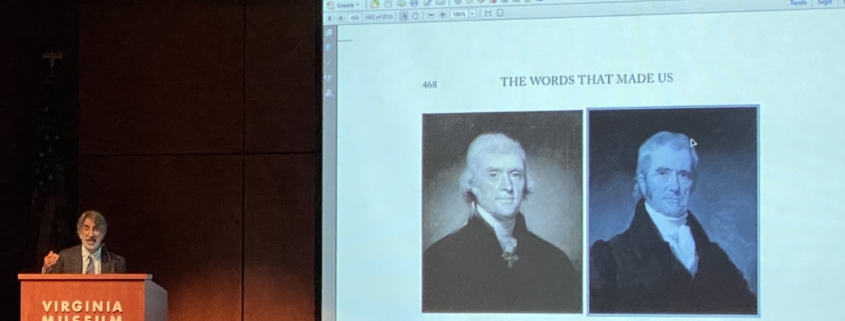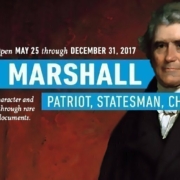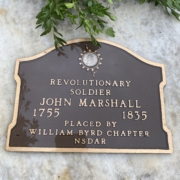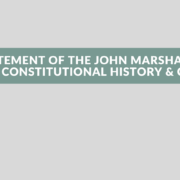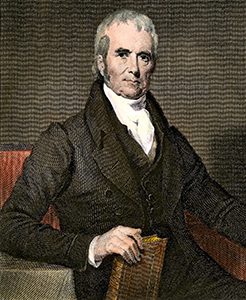Amar on America’s Fraught Founding: Lame Ducks, Deadlocks, and a Nom de Plume
Yale Sterling Professor of Law and Political Science Akhil Reed Amar presented his newest book, The Words That Made Us, America’s Constitutional Conversation 1760 – 1840, March 18, as part of the John Marshall Center’s Marshall Scholar Series, co-presented by the Virginia Museum of History & Culture. JMC and VMHC welcomed students from University of Richmond Law, Freeman High School’s Center for Leadership, Government, and Global Economics, and the Lynnhaven School to the in-person and livestreamed audience.
 Amar’s book is the first of three planned on America’s constitutional conversations; each will encompass 80 years. His talk focused on the events of 1798-1801—America’s first peaceful transfer of power (barely) from one presidential party to another, categorizing the events as “far more fraught than is generally understood today and in myriad respects cast an eerie light on the not entirely peaceful transfer of presidential power in 2020-21.”
Amar’s book is the first of three planned on America’s constitutional conversations; each will encompass 80 years. His talk focused on the events of 1798-1801—America’s first peaceful transfer of power (barely) from one presidential party to another, categorizing the events as “far more fraught than is generally understood today and in myriad respects cast an eerie light on the not entirely peaceful transfer of presidential power in 2020-21.”
In recounting the tumult of the election of 1800 that famously resulted in a tie between Democratic Republicans Thomas Jefferson and Aaron Burr, Amar introduced a lesser known – if known at all – character in the election’s ensuing drama:
“Enter ‘Horatius,’ stage right. In a pair of newspaper essays initially published in early January 1801 in the Alexandria Advertiser and widely reprinted in both the capital area and beyond, the anonymous Horatius offered a cute way of untying the ‘Presidential Knot.’ Horatius argued that the Succession Act was indeed unconstitutional. The lame-duck Congress should thus enact, and the lame-duck president, Adams, should sign, a new Succession Act designating a proper ‘officer’ to take charge after March 3 in the event of a Jefferson-Burr House deadlock. Horatius did not explicitly state what officer should now fill the blank, but the obvious choice, legally and politically, for the lame-duck Federalists, was the secretary of state. After all, he was the highest-ranking officer, except for the arguable possibility of the treasury secretary and the chief justice. But the position of chief justice was vacant in early January. And although Horatius said none of this—he didn’t need to—the sitting secretary of state in early 1801 just happened to be the Federalists’ most popular and able politician: Jefferson’s old rival and first cousin, once removed, John Marshall.
“It was an elegant and brilliant idea, a political and legal stroke of genius—evil genius, from a Jeffersonian perspective. But whose genius idea was it to crown John Marshall? Who was this Horatius? Most likely, according to modern scholars, John Marshall himself!”
Asked about Marshall’s most important Supreme Court case, Amar cited Marbury v Madison, on Marshall’s expounding prowess, “he could make the Constitution sing,” and on how he should be remembered today, “as the father of the American judiciary.”
The Worlds That Made Us is available for order through the VMHC’s bookstore. Click here for information. To view Professor Amar’s talk on John Marshall TV, click here.
The JMC Marshall Scholar Series connects historians, legal scholars, and experts with learners of all ages. JMC members, teachers, students, and veterans receive two programs each year at no cost. Memberships, which start at $25/year, support JMC’s open-access 6-12 civics resources and programs. Not a member? Click here to join! The next Marshall Scholar Series program will be announced soon.
Thank you to JMC board member Justice Stephen McCullough, Virginia Supreme Court, for moderating the Q&A portion of the program, and to JMC board members Paul Harris, Gretchen Byrd, Kevin Walsh, and Tracy Walker, and to University of Richmond Law and VMHC for making this event possible.

